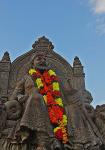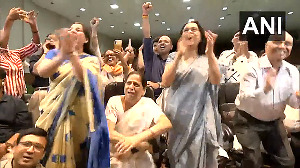Hitting out at those clamouring for dilution of the Armed Forces Special Powers Act (AFSPA), Army Chief General V K Singh is of the view that the Act is being used as a "beating stick" by the separatists in Jammu and Kashmir.
"We are unnecessarily playing into the hands of separatists for whom this is a beating stick," General Singh told PTI in a candid interview during which he spoke on Kashmir, allegations of human rights violations and security scenario in the region.
The AFSPA was being "unnecessarily demonised" although it had "nothing to do with the present unrest (in Kashmir)", he said while firmly sticking to his opposition to any withdrawal or even dilution of the Act which gives the Army vast powers to deal with insurgents.
Any move to make AFSPA non-applicable to selected areas of the state by denotifying them from the list of 'Disturbed Areas' also does not find favour with the General. "It has got no meaning," he emphasised as a "person who has been involved in Kashmir for such a long time".
General Singh was clear that non-applicability of the AFSPA to specific areas would not do. "I don't find any logic in all
this," he asserted.
His strong opposition to any dilution of the AFSPA comes in the backdrop of demands by the Jammu and Kashmir
government, separatists and others for dilution or partial lifting of the Act.
Recently, there were reports that certain districts may be removed from the list of 'Disturbed Areas' which would mean
that the Act would not apply there.
It was clear from the General's remarks that he was critical of the state administration's handling of the unrest in Kashmir in recent months during which 111 people have died.
"The state administration could have been better in tackling the way things started," he said.
Analysing the unrest, General Singh said it owed its genesis to the Amarnath Yatra agitation of 2008 "where the efficacy of
agitations
He said, "If you analyse the period from that time onward off and on they (separatists) have engineered incidents and have taken recourse to agitation to test what now became a more sustained agitational system."
The Army Chief said, "I think, to a certain extent, administratively, probably we did not draw lessons like the separatists from the agitation. I think, administratively we should have drawn lessons as to how you are going to tackle this."
Recalling the successful elections of 2008, the Army Chief said, "We had the best elections, maximum participation.
Why did it happen? Some people must reflect. It had a content which was military, had a content that was administrative and a content which was political.
"All three have to play a part, nobody can say only part achieved it... I think we should have built on that situation for better gains... We should have drawn lessons from what happened during Amarnath Yatra. I think, we would have come out better."
Rather than diluting AFSPA or withdrawing it from any place, he said if the Army is not required to operate in any area, it will not operate. "How does it make a difference? After all, situation has to be controlled by somebody, so please control it. When the situation goes bad, then you look at it."
General Singh was asked whether the current unrest in Kashmir reflected a situation similar to the 1990s. Commenting on this, Singh said it was a "different issue altogether" in the 1990s when the country was not prepared either politically or administratively to deal with the situation which was not the case now.
He felt that people of Kashmir were more interested in "rozi roti (living)" rather than protests but they were being forced into it by separatists and "peer pressure".






